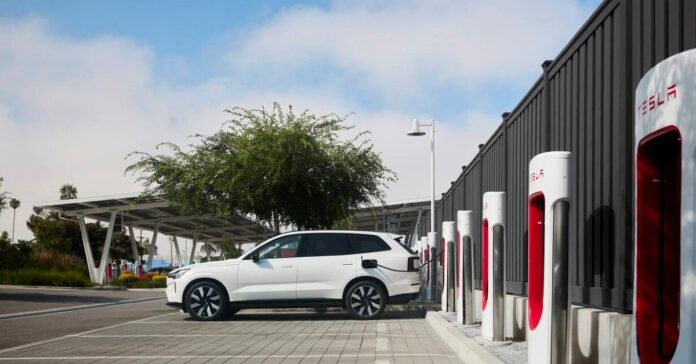Tesla has made several changes to its Supercharger network, including adding longer cables, to make the experience smoother as more non-Tesla EVs join the network and complicate things.
In North America, Tesla has been opening up the Supercharger network to electric vehicles from other automakers for the better part of the year.
Things have been moving slowly, and there are a few reasons for that.
First off, Elon Musk fired Tesla’s entire charging team earlier this year, and the company had to rebuild it, including hiring back some employees. That has slowed things down.
But Tesla also has to take things a bit slower because non-Tesla EVs using the Supercharger network complicate things.
We previously reported that the fact many charge ports are located at different locations on the vehicles than on Tesla vehicles, which are already on the back of the driver’s side.
It forces those EV drivers to park in a way that blocks another charging stall when plugging in at a Supercharger.
Longer cables at Supercharger stations are expected to fix that, but Tesla has been slow to deploy its new V4 stations, which are equipped with much longer cables.
Tesla has now released an update on the situation and how it is addressing the situation:
- Making stall availability more accurate than ever – The latest Tesla software update improves the accuracy of stall availability estimates. We can detect when another EV, with a charge port located somewhere other than the rear left or front right, is plugged into a short-cable Supercharger stall. This update ensures no more overpromising of stall availability, so you can travel with confidence. We will continuously refine this algorithm to be as accurate as possible, including exact site mapping and faster refreshing of stall availability.
- Increasing number of long cables – Longer cables mean that V4 posts can serve all port locations. In the next 18 months we will have more long cable than short cable Superchargers.
- Modifying our sites to avoid blocked spaces – We have modified over 1,500 sites so that drivers never have to use more than 2 charging spaces to charge, increasing stall availability for all.
- Encouraging the best charge port locations – Since opening up the Supercharger network in Europe in 2021, we’ve encouraged car manufacturers to transition charge port locations to rear left or front right. This provides seamless compatibility with 30k+ short-cable Superchargers available to other EVs globally.
These are all great updates.
It is frustrating to see on Tesla’s navigation that there are stalls available at the Supercharger station you are going to just to find out that the information is not accurate. In some cases, that can be because there’s indeed a stall where no one is plugged in, but you can’t park there because a non-Tesla EV is blocking it, which is OK as per Tesla’s integration of non-Tesla EVs.
It looks like now Tesla is using the data it gets when a non-Tesla EV plugs into a Supercharger to figure out whether it must be blocking the next stall. If that’s the case, that Supercharger will be marked as non-available.
It probably should have been done from the start, but I’m happy to see it happening now.
Tesla has also disclosed that it is designing and redesigning stations so that it wouldn’t happen in the first place.
With Supercharger V4 having longer cables, Tesla now expects to have more longer than shorter cables within the next year and a half.
Finally, Tesla also says that it has been encouraging other automakers to place their charge port at the location.
Electrek’s Take
I hope the latter point proves successful because I think it’s a no-brainer. The charge port should be at the back of the driver’s side.
Some automakers have also been using dual ports, most often with only one DC fast-charging one, on the driver’s side, and another level 2 charge port on the right side, which makes sense, especially for street charging in cities.
Great updates from Tesla Charging.


